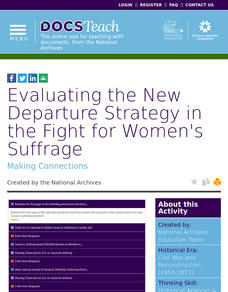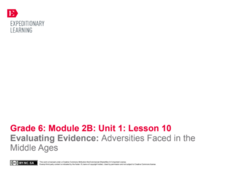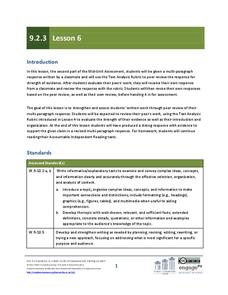Odell Education
Making Evidence-Based Claims: Grade 9
Sorry, Charlie. Scholars take a close look at Apology by Plato. Activities analyzing the text help pupils understand, make, organize, and write about claims. Learners work in groups, complete claim tools, and evaluate thinking by filling...
EngageNY
Gathering Information about Screen Time: Assessing and Reading Internet Sources, Day 1
What's the best way to evaluate a source's accuracy and credibility? Pupils discuss the question with a partner and then share their ideas with the class. They also conduct Internet research, looking for an article that answers a chosen...
News Literacy Project
News Judges
Order in the court! Scholars act as news judges, learning how to analyze the newsworthiness of several pieces of information. Working in small groups, they determine which events are most newsworthy and then complete graphic organizers...
DocsTeach
Evaluating a Needlework Sampler as Historical Evidence
Needlework isn't just for home decor; it can also help record family history. Academics analyze a needlework sampler to understand how they were used to record marriages and births. The activity includes a series of written questions,...
DocsTeach
Evaluating the New Departure Strategy in the Fight for Women's Suffrage
When women demanded their right to vote, did the Constitution already protect it? The New Departure Strategy in the women's suffrage movement made this claim through court hearings. Using documents, such as transcripts from Susan B....
Health Smart Virginia
Cyber Tattoo
Designed to inform high school freshmen about the ramifications of sharing personal information through social media, this lesson focuses on sexting. Investigators first check the validity of websites using a Website Evaluation Tool....
Overcoming Obstacles
Making and Evaluating Decisions
It's time to decide. Class members review the decision-making process (define the issue, gather information, develop alternative, and analyze the consequences). Groups then decide which of the six characters they have chosen for the...
Curated OER
My School Goal (Part 3)
Third graders, while working in small groups, determine the meaning of evaluation and why they are evaluated in school. They individually assess themselves to determine how they did on their goal sheet, and prepare to continue the use of...
Serendip
Golden Rice – Evaluating the Pros and Cons
More than half the world's population eats rice as a daily staple ... imagine if that rice could prevent illness. Scientists genetically engineered rice to include vitamin A for just that purpose. However, room for debate still exists....
EngageNY
Evaluating Evidence: Adversities Faced in the Middle Ages
How is that relevant? Scholars gain an understanding of the words relevant and compelling. They then go back to the End of Unit 1 Assessment Prompt: Adversity in the Middle Ages and look at the second bullet that pertains to relevant and...
Media Smarts
Teaching TV: Critically Evaluating TV
Mercer Mayer's There's a Nightmare in my Closet creates the framework for a specific discussion of nightmares generated by TV and a more general discussion of other emotions evoked by programs.
Museum of the Moving Image
Evaluating Information: Focus on the 2008 Election
Just how true is the information contained in political ads? Determining the veracity of campaign ads from the 2008 presidential race is the focus of a activity that introduces class members to several fact-checking resources.
Constitutional Rights Foundation
Understanding Fake News
Fake or fact? Learners must decide while looking at two published "news" stories. A reading about why fake news exists and a checklist on how to evaluate sources rounds out the activity.
Curated OER
Evaluating an Illinois Earthquake
Students develop awareness of occurrences of earthquakes in Illinois and their past and potential future damage, and examine distribution of earthquakes in central U.S. regions.
EngageNY
Grade 9 ELA Module 2, Unit 3, Lesson 6
As part of a mid-unit assessment, class members exchange their draft of a multi-paragraph essay with a classmate, review their partner's writing using the provided text analysis rubric, and evaluate the strength of evidence, the...
EngageNY
Grade 9 ELA Module 4, Unit 1, Lesson 13
Class members conclude their reading of the supplemental text, “Bangladesh Factory Collapse: Who Really Pays for our Cheap Clothes?” and use the provided Evaluating Argument and Evidence Tool to analyze the evidence Anna McMullen uses to...
Kenan Fellows
Evaluating Sensors and the Impacts of Physiological Stress: Designing a Wearable Device for Rescue Workers
A long-term project has scholars consider ways in which sensors help monitor physiological stress levels of rescue workers. They design and create a portable device for this purpose. Techies to the rescue!
Annenberg Foundation
Evaluating Evidence
Was the Civil War fought only due to slavery? Using an interactive web tool, scholars investigate the four main causes of the Civil War. Gathering evidence and data to support their claims, they present a final statistical breakdown...
Core Knowledge Foundation
Ray Charles
Introduce young learners to the read-aloud process with a short biographical passage about Ray Charles. After listening to the passage, class members respond to factual, inferential, and evaluative questions, and then create a timeline...
National WWII Museum
Strategic Decision-Making in the Pacific
Pivotal moments happened in the Pacific Theater during World War II. Some of these turning points were the result of quick decision making, while others were the result of long-term strategies. Scholars evaluate the decisions using...
National WWII Museum
The Red Ball Express: Statistics as Historical Evidence
Historians use all kinds of information to make conclusions ... including statistics. Young scholars examine how two historians evaluate The Red Ball Express—a supply line staffed primarily by African Americans—using numbers. The...
National WWII Museum
Women and the War: Supporting Historical Interpretations
Rosie the Riveter may be an iconic image from World War II, but not all historians agree on how the conflict affected women in the workplace. Individuals evaluate the writings of well-known historians on the topic, and then decide: Was...
Stanford University
Japanese American Incarceration
Using documents, such as reports from government sources and civil rights activists, budding historians explore the justification for forcing hundreds of thousands of Japanese-Americans to leave their lives and re-evaluate that tragic...
Great Books Foundation
I Shall Not Beg for My Rights
An excerpt from Henry MacNeal Turner's address to the Georgia legislature provides class members with an opportunity to develop their literary analysis skills. Prompted by the provided factual, evaluative, and interpretive questions,...
Other popular searches
- Evaluate Expressions
- Evaluate Writing Technique
- And Evaluate
- Evaluate Balance of Power
- Evaluate Information
- Evaluate Algebraic Expressions
- Evaluate Websites
- Evaluate Each Expression
- Evaluate Consumer Products
- Evaluate Functional Notation
- Evaluate Web Sites
- Evaluate One Act Plays

























